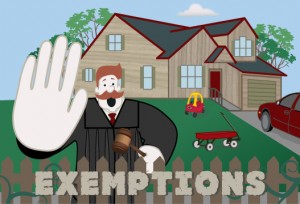 “Can I save my car if I file for bankruptcy?” “Can I save my house?” These are two of the most common questions I get as a bankruptcy lawyer. Fortunately, the answer usually is yes. And the reason you can protect your property: bankruptcy exemptions!!
“Can I save my car if I file for bankruptcy?” “Can I save my house?” These are two of the most common questions I get as a bankruptcy lawyer. Fortunately, the answer usually is yes. And the reason you can protect your property: bankruptcy exemptions!!
Bankruptcy Exemptions Protect Your Stuff
Exemptions are the key to saving your property if you need to file bankruptcy. That is because the instant a person files for bankruptcy the title or ownership of all their property is transferred by operation of law to the court appointed bankruptcy trustee. By property I mean your things like clothes, jewelry, furniture, cars, houses, etc. The trustee’s job is to sell the property of the filer’s bankruptcy estate and give the proceeds to the person’s creditors.
However, since the purpose of a Chapter 7 bankruptcy is to get a fresh start, and a Chapter 13‘s purpose is to reorganize your finances, if the filer actually lost ALL his or her property it would not be a fresh start or successful reorganization because they would then need to buy necessary replacement property. So, bankruptcy laws provide for statutory exemptions, which are state and federal laws that specifically “exempt” or “protect” certain property from being sold by the trustee. Whether the property is exempted is usually determined either by:
- the type of property, or
- the value of the property.
The good news is that usually a person following the guidance of an experienced bankruptcy attorney will not lose any property by filing bankruptcy. But it is not automatic and exemptions must be thoroughly planned before filing.
What Bankruptcy Exemptions Are Available for California Residents?
Federal bankruptcy laws allow the individual states to “opt out” of the standard federal bankruptcy exemptions that Congress designed to accompany a person’s bankruptcy filing. California has indeed “opted out” of those federal exemptions. However, in its place California has enacted its own set of exemptions under California Code of Civil Procedure §703 which closely mirror the federal exemptions. Further, this state gives its residents the ability to claim either the §703 exemptions or another set of exemptions under section §704 of the Code of Civil Procedure which is the same set it gives to people who have court judgments entered against them. But not both. In other words, you can’t mix and match exemptions from each set.
Which Set of California Bankruptcy Exemptions Should I Use?
The decision as to which set of California exemptions you will use is generally influenced greatly by the amount of equity in your family residence. If you have a lot of equity in your residence you may well need the “homestead” exemption available under the §704 exemptions and which can protect equity of between $75,000 and $175,000 depending on your family and filing status. On the other hand, if you rent or have little or no equity in your residence, your attorney may advise you to use the §703 “wildcard” exemption. This versatile exemption can protect at present about $23,250 in any property that needs protecting, and this is in addition to specific property exemptions such as the standard household goods, automobile, or wearing apparel type exemptions.
Residency Requirement for Bankruptcy Exemptions
Your bankruptcy attorney will also determine if you have lived in the state of California for at least two years which is required in order to utilize the California exemptions. Otherwise, you will have to use the exemptions provided by the state in which you lived for 180 days or the longest portion of 180 days before the last two years. Yes, applying the correct set of exemptions can be confusing.
Bankruptcy Exemption Planning
Lastly, if any of your property turns out to not be protected by your exemptions, your bankruptcy attorney can assist you in exemption planning designed to maximize your exemptions and in some case making legal and safe changes in your assets that can transform nonexempt assets into exempt assets. But please, do not be tempted to make any title changes in your assets yourself, such as transferring property to a friend, family member, or business associate, as that will not work and is the easiest way to completely lose the ability to protect the asset and could even jeopardize your ability to get successful bankruptcy discharge.
The bottom line: Bankruptcy exemptions can protect your property. But be certain to get an experience bankruptcy lawyer that understands exemptions and will work with you to guide you through bankruptcy and protect your assets along the way.
If you would like a free office consultation to discuss your situation please contact my office. I am located in Vista serving all North San Diego County.
